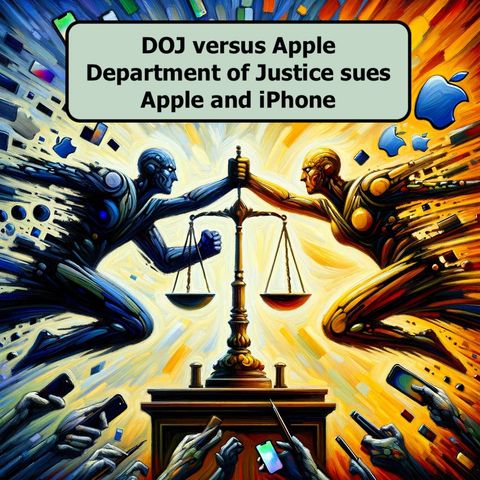Apple's Unveils Game-Changing Innovations, from AI Prowess to iOS 18 Upgrades
Jun 11, 2024 ·
2m 43s

Download and listen anywhere
Download your favorite episodes and enjoy them, wherever you are! Sign up or log in now to access offline listening.
Description
In the midst of multiple tech innovations teased at Apple's Worldwide Developers Conference (WWDC), the eye-catching elephant in the room remains the ongoing legal battle between Apple and the Department...
show more
In the midst of multiple tech innovations teased at Apple's Worldwide Developers Conference (WWDC), the eye-catching elephant in the room remains the ongoing legal battle between Apple and the Department of Justice (DOJ). The antitrust lawsuit filled in March continues to loom over the technology giant’s public image and investors mind, as the trial sets to determine the future not only of Apple but of digital marketplaces at large across the country.
While Apple introduced several promising developments at the WWDC, which include upgraded features such as Apple Intelligence, Siri, and iOS 18, the Cupertino-based company is compelled to divide its focus between innovation and litigation. Central to this antitrust suit, filled by the DOJ, is the accusation that Apple is unlawfully stifling competition through the operation of its App Store, specifically relating to its 30% commission on app sales and its purported tendency to give precedence to its own apps over those of competitors.
The tech behemoth has manifestly defended itself against these allegations, arguing that the so-called 'Apple tax' is an industry-standard fee that not only covers the running costs of the App Store but also ensures a safe and trusted platform for users and developers alike. Moreover, Apple also emphasizes that the success of its own apps can be directly attributed to their quality, security, and seamless integration with its devices, rather than imputed monopolistic practices.
Regardless of the developments in Apple's defense approach to the DOJ's antitrust lawsuit, this continuing saga is likely to cast a long shadow over any technological advancements announced at the WWDC or in the future. There's no disentangling the two narrative threads—legal proceedings and product showcasing must uncomfortably coexist.
Given the complexity and potential consequences of this legal dispute, and the widespread interest in the DOJ's regulation of tech companies, it is anticipated that this issue will remain at the forefront of tech news in the foreseeable future. The outcome of this lawsuit could determine not only Apple's business practices but the very structure of the technology industry.
Indeed, while the WWDC is typically a celebration of Apple's tech prowess, this year's conference has an uphill battle to tackle, combating doubts over Apple's business ethics while concurrently promoting its newest innovations. The world watches with baited breath, as all stakeholders, from investors to competitors, users to developers, keenly anticipate the ramifications of this decisive lawsuit.
show less
While Apple introduced several promising developments at the WWDC, which include upgraded features such as Apple Intelligence, Siri, and iOS 18, the Cupertino-based company is compelled to divide its focus between innovation and litigation. Central to this antitrust suit, filled by the DOJ, is the accusation that Apple is unlawfully stifling competition through the operation of its App Store, specifically relating to its 30% commission on app sales and its purported tendency to give precedence to its own apps over those of competitors.
The tech behemoth has manifestly defended itself against these allegations, arguing that the so-called 'Apple tax' is an industry-standard fee that not only covers the running costs of the App Store but also ensures a safe and trusted platform for users and developers alike. Moreover, Apple also emphasizes that the success of its own apps can be directly attributed to their quality, security, and seamless integration with its devices, rather than imputed monopolistic practices.
Regardless of the developments in Apple's defense approach to the DOJ's antitrust lawsuit, this continuing saga is likely to cast a long shadow over any technological advancements announced at the WWDC or in the future. There's no disentangling the two narrative threads—legal proceedings and product showcasing must uncomfortably coexist.
Given the complexity and potential consequences of this legal dispute, and the widespread interest in the DOJ's regulation of tech companies, it is anticipated that this issue will remain at the forefront of tech news in the foreseeable future. The outcome of this lawsuit could determine not only Apple's business practices but the very structure of the technology industry.
Indeed, while the WWDC is typically a celebration of Apple's tech prowess, this year's conference has an uphill battle to tackle, combating doubts over Apple's business ethics while concurrently promoting its newest innovations. The world watches with baited breath, as all stakeholders, from investors to competitors, users to developers, keenly anticipate the ramifications of this decisive lawsuit.
Information
| Author | QP-3 |
| Organization | William Corbin |
| Website | - |
| Tags |
Copyright 2024 - Spreaker Inc. an iHeartMedia Company
